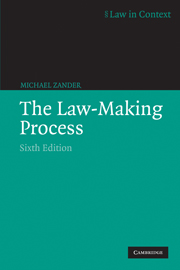Book contents
- Frontmatter
- Contents
- Preface to the sixth edition
- Preface to the first edition
- Acknowledgments
- Books, pamphlets, memoranda and articles excerpted
- Table of cases
- 1 Legislation – the Whitehall stage
- 2 Legislation – the Westminster stage
- 3 Statutory interpretation
- 4 Binding precedent – the doctrine of stare decisis
- 5 How precedent works
- 6 Law reporting
- 7 The nature of the judicial role in law-making
- 8 Other sources of law
- 9 The process of law reform
- Index
3 - Statutory interpretation
- Frontmatter
- Contents
- Preface to the sixth edition
- Preface to the first edition
- Acknowledgments
- Books, pamphlets, memoranda and articles excerpted
- Table of cases
- 1 Legislation – the Whitehall stage
- 2 Legislation – the Westminster stage
- 3 Statutory interpretation
- 4 Binding precedent – the doctrine of stare decisis
- 5 How precedent works
- 6 Law reporting
- 7 The nature of the judicial role in law-making
- 8 Other sources of law
- 9 The process of law reform
- Index
Summary
Interpretation is a necessary aspect of communication
Statutory interpretation is a particular form of a general problem – the understanding of meaning or, more broadly still, communication. Like M. Jourdain in Molière's Le Bourgeois Gentilhomme, who did not know that he was talking prose, most people are probably unaware of the extent to which the use of language necessarily involves interpretation. Even the simplest statement usually relies on an understanding of habits, knowledge, values and purposes shared between the author and the recipient of the communication. The point was made in a homely example over a hundred years ago.
Suppose a housekeeper says to a domestic: ‘fetch some soup-meat’ accompanying the act with giving some money to the latter; he will be unable to execute the order without interpretation, however easy and, consequently, rapid the performance of the process may be. Common sense and good faith tell the domestic, that the housekeeper's meaning was this: 1. He should go immediately, or as soon as his other occupations are finished; or, if he be directed to do so in the evening, that he should go the next day at the usual hour; 2. that the money handed him by the housekeeper is intended to pay for the meat thus ordered, and not as a present to him; 3. that he should buy such meat and of such parts of the animal, as, to his knowledge, has commonly been used in the house he stays at, for making soup; 4. that he buy the best meat he can obtain, for a fair price; 5. […]
- Type
- Chapter
- Information
- The Law-Making Process , pp. 127 - 214Publisher: Cambridge University PressPrint publication year: 2004



